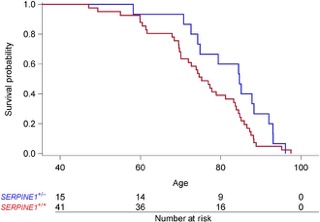
Although known mainly for their adherence to an older, simpler way of life, some Amish folks also have a genetic advantage with respect to longevity and the likelihood they'll develop diabetes. Recent research has found that members of the Old Order of Amish who carry a single copy of a mutated gene (the SERPINE1 gene) not only have less diabetes, their chromosomes have longer telomeres (1) which translates into longer lifespans.
The authors of the study, led by Dr. Douglas E. Vaughan from Northwestern University in Chicago, explained that a particular compound, plasminogen-activator inhibitor-1 (PAI-1) is a direct mediator of cellular senescence or aging. Mice that are genetically deficient in PAI-1, or in which it is inhibited, have less aging-related pathology and longer lifespans. They investigated whether the same was true in humans — specifically the Amish who carried a mutation in the SERPINE1 gene that codes for PAI-1: the mutated gene codes for a non-functional PAI-1.
There were 177 Amish participants in the study, 43 of whom carried the SERPINE-1 mutation, and 7 of those had two copies of the mutated gene (these latter were homozygous for the mutation).The investigators determined the mean leucocyte (a white blood cell) telomere length (LTL) in the carriers. They found that, compared to Amish non-carriers, the carriers had significantly longer LTL. Further, analysis of lifespans of direct relatives of the mutation carriers indicated that their lifespans were 7 years longer than those of non-carriers, as shown in the chart below (the blue line is for the mutation carriers).

Not only were the mutation carriers probably going to live longer than non-carriers, the data also showed that they were significantly less likely to have diabetes, and they had significantly lower fasting insulin levels than did non-carriers (another indication they wouldn't develop diabetes). Since the PAI-1 is involved in blood clotting, there was concern that its inactivation might lead to excessive bleeding, but the researchers found that was not the case for individuals carrying the mutated gene.
The results of this study are important for us non-Amish folk too — not that we're going to develop that particular mutation. These findings suggest another means of affecting the risk of diabetes and telomere shortening/lifespan. It may be possible to develop drugs that partially inhibit PAI-1, which in turn might prove beneficial.
Of course this was an observational study that must be replicated, and any drugs develped will have to undergo extensive testing in both animals an humans before a useful product is put on the market. Still, it provides a novel approach to dealing with at least some of the chronic ailments that accompany aging in humans.
1) A telomere is a region of highly repetitive DNA at the end of a linear chromosome that functions as a disposable buffer.



